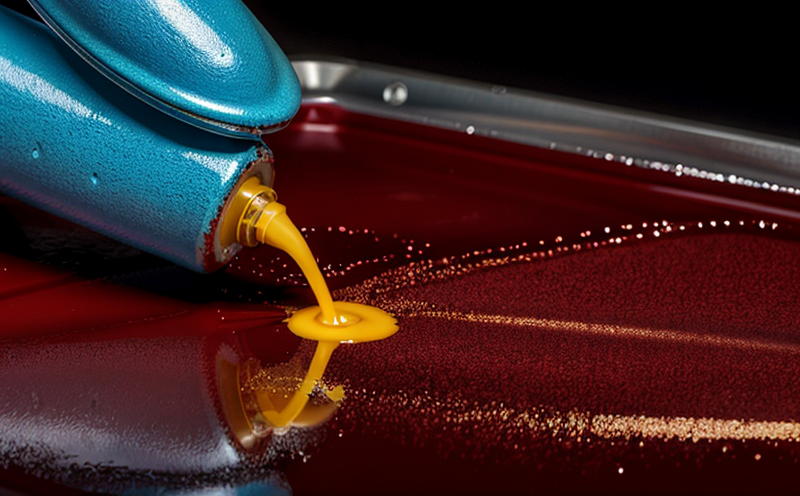Testing the effects of chemical exposure on surface finishes, including coatings and plating
The Critical Role of Chemical Exposure Testing Protecting Your Surface Finishes with Eurolab
In todays fast-paced industrial landscape, businesses rely heavily on the durability and reliability of their surface finishes, including coatings and plating. These critical components play a vital role in ensuring products meet stringent performance and aesthetic requirements. However, even the most robust surface finishes can be compromised by exposure to harsh chemicals, which can lead to damage, degradation, or even complete failure.
This is where chemical exposure testing comes into play an essential laboratory service offered by Eurolab that helps businesses like yours safeguard their surface finishes against the detrimental effects of chemical exposure. In this article, well delve into the importance of chemical exposure testing, its benefits, and what you can expect from our comprehensive services at Eurolab.
What is Chemical Exposure Testing?
Chemical exposure testing involves subjecting surface finishes to a controlled environment where they are exposed to various chemicals under simulated conditions that mimic real-world scenarios. This process helps identify how different coatings and plating materials react to specific chemical substances, allowing businesses to
Evaluate the durability and resistance of their surface finishes
Assess the effectiveness of protective coatings or treatments
Develop strategies for mitigating damage caused by chemical exposure
Why is Chemical Exposure Testing Essential?
In todays competitive market, ensuring product quality and reliability is paramount. Chemical exposure testing provides an unparalleled level of assurance that your surface finishes can withstand the rigors of industrial environments. By investing in this laboratory service, youll enjoy numerous benefits, including
Improved Product Reliability Identify potential weaknesses in your surface finishes before they become a problem.
Enhanced Quality Control Develop more effective testing protocols to ensure products meet regulatory and customer standards.
Reduced Warranty Claims Minimize the risk of costly warranty claims due to premature failure or degradation caused by chemical exposure.
Increased Efficiency Streamline product development and manufacturing processes with confidence in your surface finishes performance.
Key Benefits of Chemical Exposure Testing
Comprehensive Results Receive detailed reports outlining the effects of chemical exposure on your surface finishes, including visual inspection data, mechanical property analysis, and corrosion testing results.
Customized Solutions Collaborate with our experts to develop tailored testing protocols that cater to your specific needs and regulatory requirements.
Scalable Testing Capabilities Leverage our state-of-the-art laboratory facilities and expertise to handle large volumes of samples or complex testing schedules.
Fast Turnaround Times Benefit from accelerated testing cycles without compromising data accuracy or integrity.
QA Section Frequently Asked Questions about Chemical Exposure Testing with Eurolab
Q What types of surface finishes can be tested?
A Our laboratory services cater to a wide range of coatings and plating materials, including paints, varnishes, chromates, anodized aluminum, and more.
Q Can chemical exposure testing simulate real-world conditions?
A Yes! Our controlled environment allows us to mimic various industrial scenarios, including temperature, humidity, and chemical concentrations, ensuring accurate results that reflect actual product performance.
Q How long does a typical testing cycle take?
A Testing times vary depending on the complexity of the test protocol and sample type. However, most standard tests can be completed within 2-6 weeks.
Q Are the results of chemical exposure testing confidential?
A Absolutely! Our laboratory services are designed to meet the highest standards of confidentiality, ensuring that your data remains protected throughout the testing process.
Q Can I collaborate with Eurolab experts to develop customized testing protocols?
A Yes! We encourage active participation from our clients in developing tailored testing strategies that address specific needs and regulatory requirements.
Conclusion
Chemical exposure testing is an indispensable laboratory service for businesses seeking to protect their surface finishes against the detrimental effects of chemical exposure. At Eurolab, were committed to providing comprehensive solutions, expert analysis, and fast turnaround times to ensure your products meet stringent performance and aesthetic standards.
Dont let chemical exposure compromise your products reliability or safety. Partner with Eurolab today and gain confidence in your surface finishes ability to withstand the challenges of industrial environments. Contact us to learn more about our laboratory services and discover how we can help you safeguard your products and protect your brand reputation.
-
Testing chemical resistance of materials in various industrial environments
-
Evaluating how different materials react when exposed to specific chemicals
-
Assessing the long-term compatibility of materials with various chemical substances
-
Determining how chemicals affect the physical properties of metals, plastics, and ceramics
-
Simulating material failure under different chemical exposures in manufacturing processes
-
Evaluating the impact of chemical exposure on material integrity in harsh environments
-
Ensuring that chemical formulations do not compromise the strength or performance of materials
-
Assessing compatibility with materials used in packaging, coatings, and containers
-
Testing the impact of aggressive chemicals on seals, gaskets, and other critical components
-
Evaluating the interaction between different chemicals and materials used in consumer products
-
Testing the effect of chemical exposure on elastomers and rubber materials
-
Assessing the compatibility of composite materials with aggressive chemicals used in industrial applications
-
Ensuring that chemicals do not cause degradation or corrosion of equipment, pipelines, or tanks
-
Simulating different chemical exposure scenarios to determine material suitability and durability
-
Testing materials for compatibility with chemicals at different temperatures, pressures, and conditions
-
Evaluating chemical interactions between two or more substances and their effect on material properties
-
Testing the compatibility of materials used in the automotive, aerospace, and medical industries with chemicals
-
Determining the best material choices for applications involving aggressive chemical environments
-
Ensuring the safe use of chemicals in consumer goods by testing material compatibility for health and safety
-
Evaluating the stability of materials over time when exposed to chemicals in manufacturing and storage
-
Determining the performance of coatings and films when exposed to various chemicals used in industrial processes




